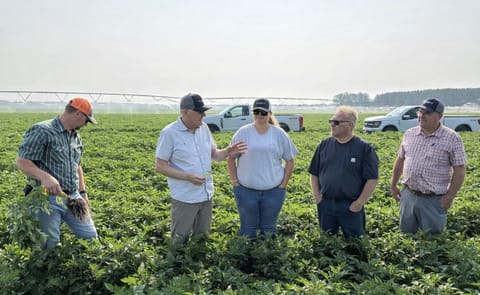Moisture probe in a potato field to measure the moisture content of the soil (picture added in 2017)
Frito-lay wants to run the chips factory on water extracted from the potato

Food giant PepsiCo has come up with a novel way to cut its water consumption - by extracting it from potatoes and recycling it.
Walkers crisps prides itself on using only UK potatoes for its crisps but Walter Todd, PepsiCo's vice president of sustainability for Europe says there is a risk that in a particular season, a disastrous drought could force the company to source some of its potatoes from Europe.
PepsiCo UK and Ireland had already achieved a 45% reduction in water use between 2000-2008 and achieved a further 14.6% reduction last year.
The company has committed to taking its four crisp factories off the water mains within 10 years although Todd hopes this can be achieved in half the time.
He says: "We use around 350,000 tonnes of potatoes a year and 80% of a potato is water. So as we cook potatoes the water is boiled off and we lose it so the challenge we set ourselves is how to capture that water and use it in our operations so we take no water from the mains – we have got plans to get 80% there already."
PepsiCo intends using the technologies that are being developed in areas of the world that are already suffering from water stress.
The company is also spending £250,000 this year testing a new probe, the i-Crop, that sits in potato fields and monitors the moisture in the soil and links to a weather forecasting system. This then sets the amount of water that is used to irrigate the fields.
"This not only means we use water more efficiently but also reduces the impact on the environment in other ways such as reducing fertiliser and pesticide run-off, which has a benefit for biodiversity. Also when too much water is applied to the soil, the potatoes shut down so this system also improves our yields.
"Given that water is a local issue, it will help farmers create environmental strategies that are bespoke to their farm.
The other key way that PepsiCo is planning to reduce its water footprint is by changing to new varieties of potato that require the least amount of irrigation, produce higher crop yields and can more easily be stored.
The company is currently carrying out large scale multi-million pound trials on new potato varieties and has set the target of replacing over 90% of its Saturna, Hermes and Lady Rosetta varieties within the next five years.
Like to receive news like this by email? Join and Subscribe!
Get the latest potato industry news straight to your WhatsApp. Join the PotatoPro WhatsApp Community!
Highlighted Company
Potato varieties mentioned
Sponsored Content
Sponsored Content
Sponsored Content
Sponsored Content













